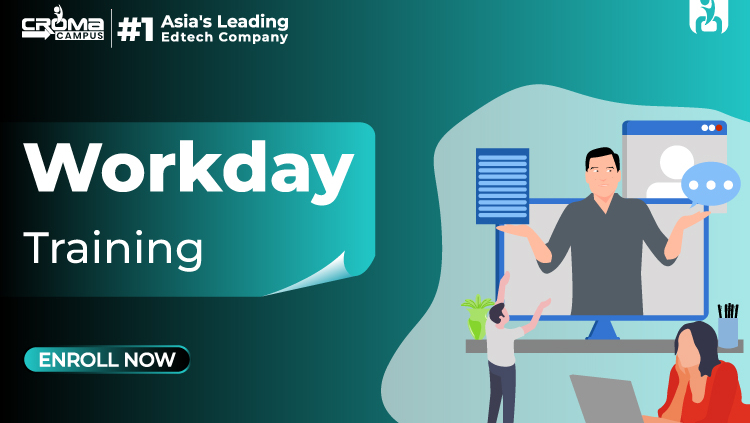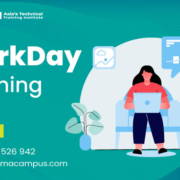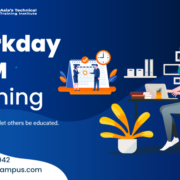How Workday Automates Candidate Screening: The Tech Behind Faster Hiring?
Introduction:
In Hyderabad, where IT firms are expanding rapidly and recruitment is round-the-clock, the issue is not getting people-it’s weeding out hundreds of job resumes in a short while. Several companies are now implementing Workday to address the problem.
If you are getting a Workday HCM Certification, it’s crucial that you understand how these features operate in real life. In this blog, I describe the technical aspect of candidate screening in plain, easy-to-understand language obfuscatory jargon, just honest understanding.
How Candidate Data is Collected and Understood?
When a job applicant applies for a position, they tend to upload their resume. Workday doesn’t simply store this resume as a document. It interprets the document through Natural Language Processing (NLP). This parsing splits the resume into formatted data such as name, experience, skills, qualifications, languages, and so on.
All this is kept in a system known as the Workday Recruiting Object Model. Here, each candidate is a data object. This object is linked to job positions, recruiters, interview phases, and offer workflows. If the resume is modified in the future, Workday automatically modifies the data as well. That is a lot of time saved and errors avoided.
How Workday Automatically Filters Candidates?
Once stored, Workday applies various filters to determine whether the candidate is a match for the job or not. These filters are established by recruiters or HR managers during Job Requisition configuration.
- Eligibility Rules: Determines if the candidate satisfies minimal requirements such as education level, location, or work status.
- Knockout Questions: These are straightforward yes/no questions. If a candidate responds “no” to one like “Will you relocate?”, they can be eliminated.
- Keyword Matching: Workday scans the resume for keywords from the job description that are important. The more applicable keywords it locates, the greater the score.
- Skills Cloud Matching: This is an AI-powered system. It matches similar or related skills even if they are worded differently. For instance, “frontend developer” and “React JS” can be linked together.
All of this happens by the system itself. The recruiter has a list to look at of the top-ranked candidates only.
| Filter Type | Technology Used | What It Does |
| Resume Parsing | NLP | Converts resume text into searchable, structured data |
| Eligibility Rules | Logic Rules | Checks qualifications, location, and other basics |
| Keyword Matching | Scoring Algorithm | Scores resumes based on keyword relevance |
| Knockout Questions | Boolean Logic | Filters out candidates with disqualifying answers |
| Skills Cloud Matching | AI/ML (Skills Cloud) | Matches resume to job using smart skill recognition |
| Candidate Ranking | Weighted Attribute Calculation | Assigns a score and places candidates in order |
Smarter Hiring Using AI Models:
Workday also applies machine learning to enhance screening outcomes. These models are trained on previous data. They verify who was hired, who was rejected, and who performed well afterwards. According to that, the system refines the way it scores new applicants.
Suppose five candidates hired last year possessed “Java + SQL” skills and belonged to startups. Workday’s AI can start giving more importance to such profiles automatically. This is known as Predictive Hiring.
In Hyderabad, most companies are applying this in industry verticals such as fintech, health-tech, and ed-tech. Since the hiring is quick and the job profiles are technical, this AI model reduces screening time by half.
This is also the reason why training companies providing Workday Payroll Certification nowadays incorporate AI-driven models for hiring within their course. It’s becoming a must-learn skill for recruiters and HR tech professionals in the city.
Actions That Workday Can Perform Automatically:
Workday is not only about filtering. It can even do something for the recruiter automatically with triggers. Those are Workday Events or Automated Actions. Depending on candidate scores or responses, the system can:
- Advance candidates to the next interview stage
- Allocate a task to a particular recruiter
- Send an automated rejection or follow-up email
- Mark a profile as a duplicate
- Schedule interview slots using calendar sync
This minimizes manual effort on the recruiter’s part. They only deal with instances where human judgment is required. For a job ad in a competitive market like Hyderabad, where 300+ applications can be received for one job posting, this automation saves days of effort.
These features are usually instructed in a hands-on manner as part of Workday HCM Training in Hyderabad, where students create live recruitment workflows.
What If Screening Goes Awry?
Automation is useful, provided that the rules and data are accurate. Occasionally, businesses err in ways such as:
- Inaccurate keywords in the job description = wrong match
- Too strict knockout questions = losing good applicants
- Too much emphasis on one ability = overlooking other strong profiles
That’s why Workday makes manual overrides available. Recruiters can always reverse an auto-reject or modify a score. The system also has audit logs so decisions can be traced later.
Sum Up:
Workday applies NLP and AI to transform resumes into searchable information. Keyword matching and rule-based filters screen candidates quickly. Skills Cloud discovers hidden equivalents between job roles and resumes. Predictive models learn from previous hiring data to refine recommendations. Workday triggers automate interview scheduling, emails, and assignments. In Hyderabad, where IT recruitment is high-volume, these solutions save HR workload. Manual review and audit logs ensure the process remains fair and compliant.








Leave a Reply
Want to join the discussion?Feel free to contribute!